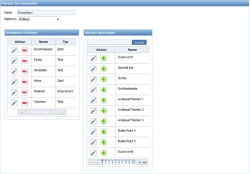
In 2009, Korhan Canbolat founded the Canbolat Vertriebsgesellschaft (English translation: Canbolat Distribution Company) and has turned it into an efficient and sustainably successful online retail company since then. With a wide range of goods in the do-it-yourself, beauty & health as well as home & living categories, the company is currently active on 16 sales platforms and several of its own stores in 6 European countries. In this interview, Canbolat explains how important good product information management (PIM) is for the success of an online retailer.
Mr. Canbolat, as an online retailer, what requirements do you have in your daily work for a modern PIM system?
Clearly arranged in-house data administration and management is an important competitive criterion for any online retailer with a product range of several hundred or even thousands of articles that generate a multitude of online offers. It is extremely important for me to have all article data available in one uniform system in standardized form and the respective ideal data format. To be able to optimally place choices on different platforms and enable a quick response to market developments, I need clear structuring of my product selection based on distinct categories and the free allocation of inherited attributes within this structure. Of course, this also includes efficient search and filter functions to make management of large product selections easier.
One special challenge for my associates is the multilingual presentation of our products on platforms all over Europe. The devil is often in the details. Many online retailers shy away from entering otherwise very interesting foreign-language markets, because their PIM systems are not able to handle the complexity of multiple languages for an article’s master data and attributes and managing it “manually” eliminates any cost effectiveness.
How should a PIM system support product presentation on different sales platforms?
I operate shops on several European Ebay and Amazon platforms, but also on Rakuten, Priceminister, Bol.com and other marketplaces. Each of these platforms has its own category structure and requires its own attributes. If you want to be successful as a retailer on as many top-selling sales platforms as possible, you need a system that enables applicable matching of internal categories, attributes and attribute values to the respective platform values with minimal effort. The larger the retailer’s product choices, the more a professional concept for category and attribute management pays off, because it determines how much time and effort is required for the exact placement and optimal description of all products.
Just as important for me is the simple and clear management of all my online offers in a back end system. This is the only way to keep an eye on the different platforms and efficiently conduct price and quantity updates for individual articles or the entire range of products with manageable time and effort. Synchronizing, processing, updating and deactivating of products needs to happen quickly and reliably – and is best done via mass update.
Which software solution do you use for the PIM system and what advantages does it offer you?
I was able to gain experience with the ATHENOS PIM 2.0 as a pilot customer. Like all other ATHENOS modules that I use, PIM 2.0 is also consistently geared towards simplifying daily operating processes in online retail and largely automating routine processes. Well-thought-out functions help exactly where you would otherwise spend a lot of time and tie down resources. Here are just two examples of this: generating variables is a tedious and time-consuming task when you manually enter the same data for each variable repeatedly and only change the item number and one single attribute. ATHENOS provides a copy function for this with which all article data can be carried over from an existing article – very simple, but it saves us time and nerves when setting up an article.
Multilingual attributes that we need to operate our foreign sales platforms are implemented just as well. Instead of representing each language through its own article assigned attributes, management and allocation of attributes always happens in standard language with ATHENOS®. The attributes and their values can be translated into as many target languages as you want via a transformation matrix. The language needed for the respective sales platform is chosen during the upload, the attribute structure is preserved. This makes the handling of attributes and updating sales offers much easier.
What is your motivation for getting involved with the newly developed software as a pilot customer?
Of course, there is always risk in testing a new development live as the first customer. There is always something that doesn’t work the way you expect it to work, but I gladly take the risk, because for me the benefits outweigh the risks. On the one hand, I have the chance to access the software’s new functions sooner than others do, which gives me a competitive advantage. On the other hand, as a pilot customer, I have the opportunity to already introduce my own ideas and practical experiences and have an impact during the software’s development so that new features consider the current challenges of my business. With Trinodis, I have a partner that responds very quickly to each new challenge.
The further development of ATHENOS is always geared towards improving processes for the customer. This was the foundation for the previous development of my company and it gives me a safe outlook to also factor in a growth of more than 20 percent for the coming year.
Interview by Daniel Stöter, iXtenso.com









